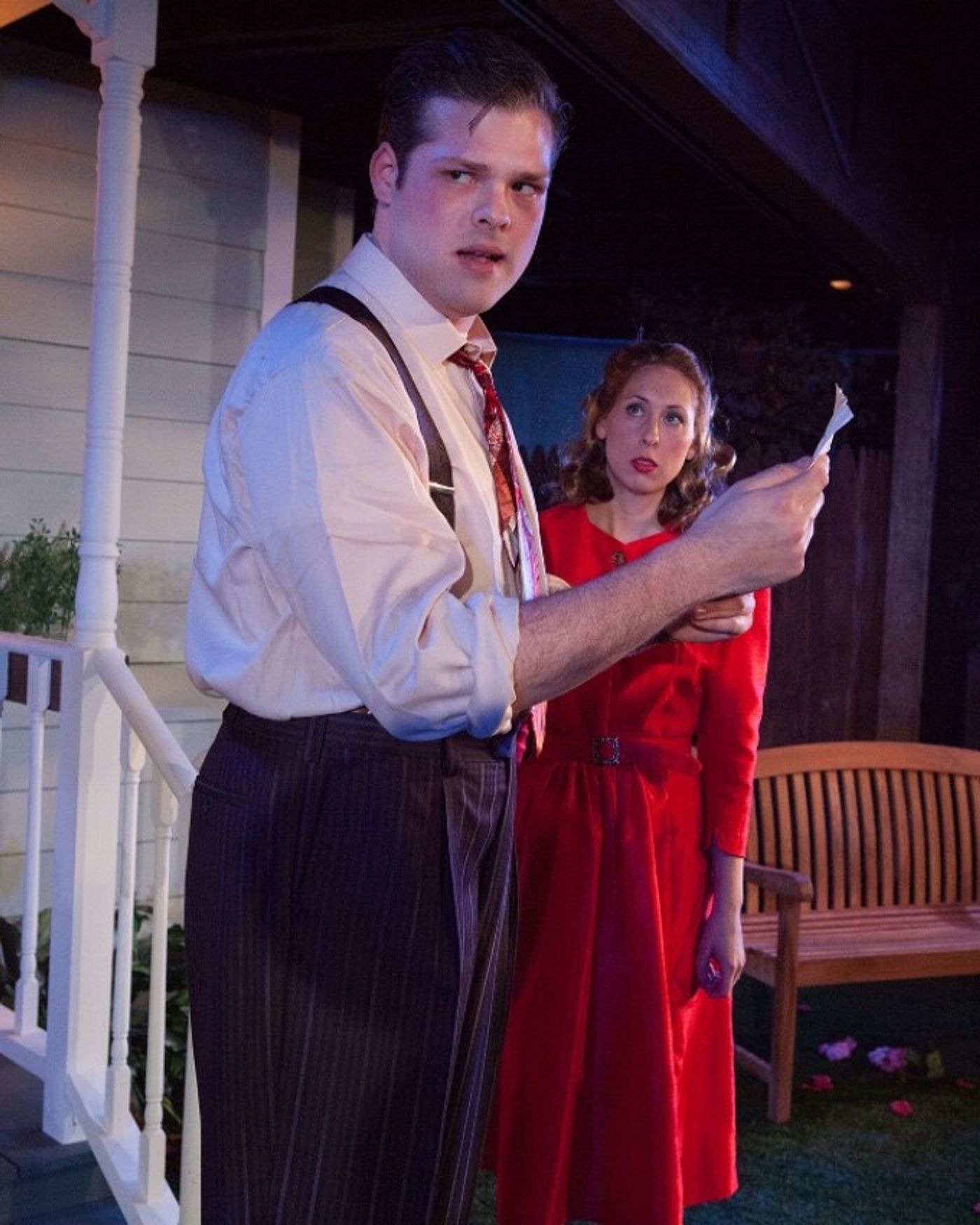Review: Swift Creek Mill's ALL MY SONS: A Haunting Glimpse at an 'American Dream' Gone Awry
 *Review by Brent Deekens
*Review by Brent Deekens
I must preface this article to indicate that as much as I found this production of ALL MY SONS to be beguiling and devastatingly gripping, I found myself thinking, "Wow, people just don't talk this way anymore. In fact, they really don't act this way anymore, either." The play was written and set in 1947.
To readers and potential viewers (especially of the younger persuasion) who are unfamiliar with the works of playwright Arthur Miller, or indeed the types of dramatic entertainment that existed in the decades wherein he wrote most prolifically, allow me to elaborate.
Theatre and audible motion pictures ("talkies") of the 1930s and 1940s had an atypical style to the contemporary works we see and hear today (obviously). The language that composed the dialogue was often heightened - not exactly realistic to the most scrutable degree, but it still managed to be flowery, very informative, and often very clever and funny ("The Marx Brothers" in particular were champions of such golden-delicious loquacity). Thence, the styles of acting were often complimentary to such verbiage; the actors exuded the importance (or perhaps the zinging punch lines) of the author's words through their physical interpretation of the character (Shakespeare contains this diligence as well). Many of said thespians also spoke in the "Transatlantic Accent" of the day; one might commonly hear such an "old timey" affectation in newsreels or over radio broadcasts and serials.
With this in mind, it fell onto guys like Arthur Miller to courageously act as a literary axon, to bridge the gap between "heightened dialogue" and the more realistic, "down-and-dirty" utterances of everyday life. And Miller met this challenge with multiple success stories, one of which was ALL MY SONS, his first major hit that took him six years to complete.
ALL MY SONS takes place over the course of two weighty days, entirely in the backyard of a quaint house nestled in the bosom of small-town Americana. Joe Keller (Barry Pruitt in a humble yet layered performance) is the 60-year-old patriarch of the Keller family whose name has been rather smeared by the court of public opinion for his perceived involvement of shipping out damaged aircraft engine cylinder heads from his factory to the US military three and a half years prior. This act of negligence resulted in the deaths of twenty-one World War II pilots. Joe laid the blame on his former neighbor and business partner Steve Deever who, at present, sits in jail. Steve's daughter Ann (a justifiably reserved Maggie McGurn) has returned home from New York City to visit with the Kellers. Though she appears calmly cheerful, she remains quietly conflicted by the fact that regardless of her father's incarceration, she has feelings for Chris Keller (a towering George Dippold), the Keller's youngest son. Others in the Keller circle feel that Ann may carry protracted feelings for her old boyfriend Larry Keller, the Keller's oldest son who was "lost" in the war. Chris' mother Kate (Jacqueline O'Connor, in the performance of a lifetime) remains in denial of Larry's uncertain demise, going so far as to dabble in astrology and mysticism with her neighbor Frank Lubey (a charming Frank Creasy) to convince herself that Larry will one day return home to marry Ann.
Now, this admittedly dense framework lays out the very foundations for the first act, which is deliberately paced to give the audience every bit of information they need to go into the second act... which packs a resounding punch with the arrival of Ann's enraged brother George (an intense Matt Hackman)! So it goes without saying, in regards to the first act: "attention must be paid." (Wink, wink; I couldn't resist.)
Under the capable direction of Tom Width and an attractive set by Jason "Blue" Herbert, this company of actors recreates a long-lost world with acting choices and accents that might seem foreign to newer audiences. But the result is authentically executed for the time and place.
Rounding out the company are the equally-capable performances of Adrian Grantz (Dr. Jim Bayliss), Louise Mason (Sue Bayliss), Tara Callahan Carroll (Lydia Lubey), and the theatrical debut of first-grader Jude Yaktin as Bert (who incidentally shares his role with a fourth-grade actor named Aidan Montefusco on different nights).
In doing my homework for this article (which ended up being lengthier than I had originally calculated), I felt that I had to read more on Arthur Miller. A complicated man of many marriages, he had a particular fascination with characters making declarative or even aggrandizing statements ("This is the land of the great big dogs, you don't love a man here, you eat him.") while simultaneously placing said characters into less than impossible situations. These situations often involved - for lack of better phrasing - "an elephant in the room," whether it's Willy Loman's burgeoning insanity in DEATH OF A SALESMAN or Eddie's inappropriate feelings for Catherine in A VIEW FROM A BRIDGE or the fact that the women of Salem are just flat-out lying in THE CRUCIBLE. Combined with the social and moralizing aspects of his plays, ALL MY SONS bears all the main hallmarks of Miller's compacted style and yearning dialogue.
This goes on to show that if Swift Creek Mill's production of ALL MY SONS can imbue me with such an ardent respect towards the application of research into this article, then there has to be something to it. And I think there is. In fact, I've already bought my tickets for another viewing.
ALL MY SONS plays at Swift Creek Mill through February 24th.
Reader Reviews
Videos

